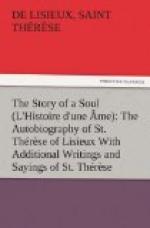“There,” she said, “from this onwards I permit you to cry as much as you like on condition that it is into the shell!”
A week, however, before her death I spent a whole evening in tears at the thought of her fast-approaching end. She knew it, and said: “You have been crying. Was it into the shell?” I was unable to tell an untruth, and my answer grieved her. “I am going to die,” she continued, “and I shall not be at rest about you unless you promise to follow faithfully my advice. I consider it of the utmost importance for the good of your soul.”
I promised what she asked, begging leave, however, as a favour, to be allowed to cry at her death. “But,” she answered, “why cry at my death? Those tears will certainly be useless. You will be bewailing my happiness! Still I have pity on your weakness, and for the first few days you have leave to cry, though afterwards you must again take up the shell.”
It has cost me some heroic efforts, but I have been faithful. I have kept the shell at hand, and each time the wish to cry overcame me, I laid hold of the pitiless thing. However urgent the tears, the trouble of passing it from one eye to the other so distracted my thoughts, that before very long this ingenious method entirely cured me of my sensibility.
* * * * * *
Owing to a fault which had caused Soeur Therese much pain, but of which I had deeply repented, I intended to deprive myself of Holy Communion. I wrote to her of my resolution, and this was her reply: “Little flower, most dear to Jesus, by this humiliation your roots are feeding upon the earth. You must now open wide your petals, or rather lift high your head, so that the Manna of the Angels may, like a divine dew, come down to strengthen you and supply all your wants. Good-night, poor little flower! Ask of Jesus that all the prayers offered for my cure may serve to increase the fire which ought to consume me.”
* * * * * *
“At the moment of Communion I sometimes liken my soul to that of a little child of three or four, whose hair has been ruffled and clothes soiled at play. This is a picture of what befalls me in my struggling with souls. But Our Blessed Lady comes promptly to the rescue, takes off my soiled pinafore, and arranges my hair, adorning it with a pretty ribbon or a simple flower. . . . Then I am quite nice, and able, without any shame, to seat myself at the Banquet of Angels.”
* * * * * *
In the infirmary we scarcely waited for the end of her thanksgiving before seeking her advice. At first, this somewhat distressed her, and she would make gentle reproaches, but soon she yielded to us, saying: “I must not wish for more rest than Our Lord. When He withdrew into the desert after preaching, the crowds would come and intrude upon His solitude. Come, then, to me as much as you like; I must die sword in hand—’the sword of the Spirit, which is the Word of God.’"[18]




